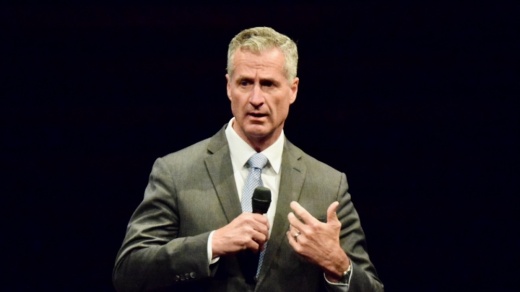Brad Jones, interim president and CEO of ERCOT, shared new accountability plans and fielded several questions in a town hall coordinated by state Reps Matt Shaheen, R-Plano, and Jared Patterson, R-Frisco, on Dec. 1 at the George A. Purefoy Municipal Center.
The reliability of the state’s electric grid ahead of this winter was the focus for officials as they spoke before dozens in attendance. The town hall in Frisco was among other town halls being held across Texas. Area residents in the town hall lamented the widespread, deadly blackouts that occurred in February that left thousands without power for days.
“The distribution companies, they have to get prepared for the potential if we need to have load shed,” Jones said regarding rolling blackouts. “They have to make sure supplies are ready for keeping customers ... off [no] more than an hour at a time.”
Jones said through Dec. 2-29, ERCOT will begin inspecting more than 300 generating units across the state. These units make up 85% of the lost megawatt hours during the February storm. According to Shaheen, there are roughly 900 units across the state.
Weatherization elements that ERCOT will look for during its inspections, according to Jones, include heat-tracing elements on pipes, enclosures over equipment to fight against wind chill and insulation over equipment that needs it.
He said units that fail inspection will be reported to the Public Utility Commission of Texas, which can enforce fines of $1 million per day for each occurrence.
“We're focusing on those that created the most problems for us,” Jones said. “They know they’re on the hook. They know that we’re going to be coming, and we’ve got an extraordinarily strong team.”
Inspection results, he said, will be shared by early January.
ERCOT’s new ability “to force” generators to comply with these standards comes from Senate Bill 3, which was passed by the Texas Legislature in its 87th session. Policies affecting the electricity grid are the most substantial changes in more than two decades, Patterson said.
“This isn't something that we can answer in a soundbite. It's not something that can be put out in a tweet,” he said. “These are very complicated issues that have very complicated responses, because you start to tinker with one little thing in the market, and it affects all these other things.”
Shaheen said “more stringent” audits of emergency operation and disaster recovery plans at generating units will coincide with the inspection of the 300 units. In addition, Patterson said all companies will now have to coordinate with the Texas Division of Emergency Management to recover from future disasters.
“Something's going to happen again, whether it's a winter event or whatever,” Shaheen said.
Shaheen said as the state’s population continues to climb, more generating units will be necessary to support residents.
“It's kind of like education just by the fact that our enrollment grows every year,” he said. “We're constantly increasing the funding for education. We're going to be doing the same thing with this.”







